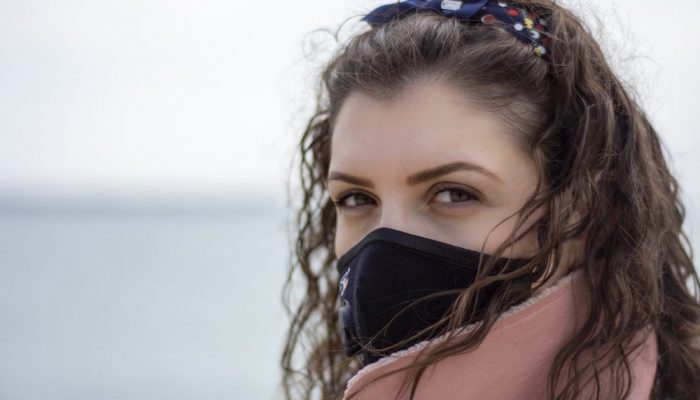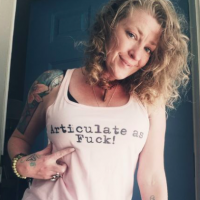*Editor’s Note: Elephant Journal articles represent the personal views of the authors, and cannot possibly reflect Elephant Journal as a whole. Disagree with an Op-Ed or opinion? We’re happy to share your experience here.
Check out Elephant’s Continually-updating Coronavirus Diary. ~ Waylon
~
They say anxiety is us weaving conspiracy theories about ourselves.
But what if those feelings are already there, and we are actually telling stories to support them?
We weave stories to try to explain how something inhuman and awful could happen to us. We also need people. Sometimes the very people who are responsible for our pain are responsible for our care.
How we form our early attachments makes a lasting impression on how we view and interact with the world. If we feel seen and heard and our needs are met, then we form healthy bonds. We learn to trust life.
If parents are violent or sporadically available, we may form what is known as an anxious attachment. This type of attachment has been linked to people who are attracted to what is commonly referred to as conspiracy theories.
This is not by any means my desire to invalidate all alternative narratives. I think we have the right and need to think critically for ourselves, to gather information and disseminate it. The label “conspiracy theorist” is reductionism, in my opinion, in the same way the label “addict” is. We need to look at pain, habits, and values to better understand people.
Trauma is inherited behaviorally, as well as genetically. It changes our epigenome (that’s the most mutable part of the gene). In order to deal with trauma, we adapt and numb—or, as Gabor Mate says, ritually, compulsively comfort-seek. We also tend to recreate the feelings we are familiar with, whether through substance use, relationship dynamics, or the ways we gather and assimilate information.
“Addiction is only a symptom, it’s not the fundamental problem. The fundamental problem is trauma.” ~ Gabor Mate
It helps make sense of the pain and confusion to have an external source that random synchronicity can be pinned to, establishing a plot. It keeps the cause of pain turned outward, confirming victimization, combined with aggrandizement—“I know what’s really going on!”—and that keeps the pain-trance-narrative in place.
Good people simply seeking resolution can go down endless rabbit holes re-traumatizing themselves, keeping those stress hormones active, and endlessly seeking answers through a lens of paranoia.
Whether we cling to conspiracies as a means of creating a sense of context for the world or adhere to what is known as the mainstream narrative, neither position excuses us from being decent humans to each other or tending to our individual and shared vulnerability.
“The true measure of any society can be found in how it treats its most vulnerable members.” ~ Mahatma Gandhi
The conditions brought about by COVID-19 are showing us that we are all vulnerable. And we will be dealing with the repercussions of this for years to come. Mental health challenges, as well as domestic violence rates, climb as we isolate to slow the curve of infection.
Our circumstances are also showing us what is truly essential. Some CEOs have proven to be little more than bloated, pontificating ticks who are incapable of keeping their own companies afloat, while grocery clerks, truck drivers, and nurses are holding the fabric of society together. Way to—non-violently—flip the narrative!
And, speaking of narratives, let’s come back to conspiracies, trauma, and of course—compassion.
What we are—all of us—is a group of people who have been personally, and collectively, traumatized in big and small ways.
Some people are more distrustful of authority than others and look for answers beyond the mainstream narrative. Some of those people are highly intelligent. Included in this profile is often a belief in world values beyond the capitalist materialism that has been proffered to us in every form—including spiritualism—for millennia.
We need to research facts, check resources, and make sure that our values and practices are not harmful to ourselves or others, and treat each other with respect and decency.
Just because there are events rising in concert with each other does not mean that there is some nefarious grand design being played out.
Can we look at separate events in the world through a lens of curiosity and, in some instances, concern, without the need to manufacture evil plots, but instead to rationally and compassionately address what is happening?
Three popular narratives that are not nefarious plots, but are worth paying attention to:
1. Plot: Bill Gates intends to mandatorily vaccinate the world and microchip people while he’s at it.
Fact: Gates is funding vaccine development for COVID-19, and there is a program called ID2020, whose goal is to “get digital ID right.”
My best friend just had his social security number stolen. Identity theft affects millions of people. COVID-19 has currently killed 289,000.
Gates develops artificial intelligence. Of course that is his solution. No nefarious agenda needed. He’s just doing what he does, and will no doubt profit.
2. Plot: This is all a cover-up for busting a global pedophilia ring.
Fact: Human trafficking is an epidemic. An estimated 21 million people a year fall prey to this multi-billion dollar industry.
In Hollywood specifically, Harvey Weinstein, among others, has been arrested for vile sexual misconduct. And, there is a global organization that has been covering up heinous acts by pedophiles for hundreds of years; it’s called the Catholic Church.
3. Plot: It’s all about 5G.
Fact: The FDA states that there are no adverse effects from 5G detectable on the human body.
Let’s say 5G poses no real threat to the human body, or the environment, as the FDA states. We can still think, critically, about what it will do to our brains to be that much more connected to the internet at all times. Already, an over-dependence on our technological devices, including electricity, has been found to be disruptive to our circadian rhythms.
We are advancing technologically, and have been ever since our great-great-ancestor Ug figured out how to harness fire, and then Ugoola invented the wheel. It’s not going to stop.
What we need to do now is to each, personally and collectively, decide what our interface with technology is going to look like going forward. We can access more information than at any time previously in our history. We need to be responsible and compassionate with how we wield that power.
Information can be used to trap our minds or to set them free.
We have an opportunity—now as always—to shame, blame, attack, and divide, or to come together and discover our empathy and humanity, to lean into our vulnerability and our love for life together.








Read 27 comments and reply